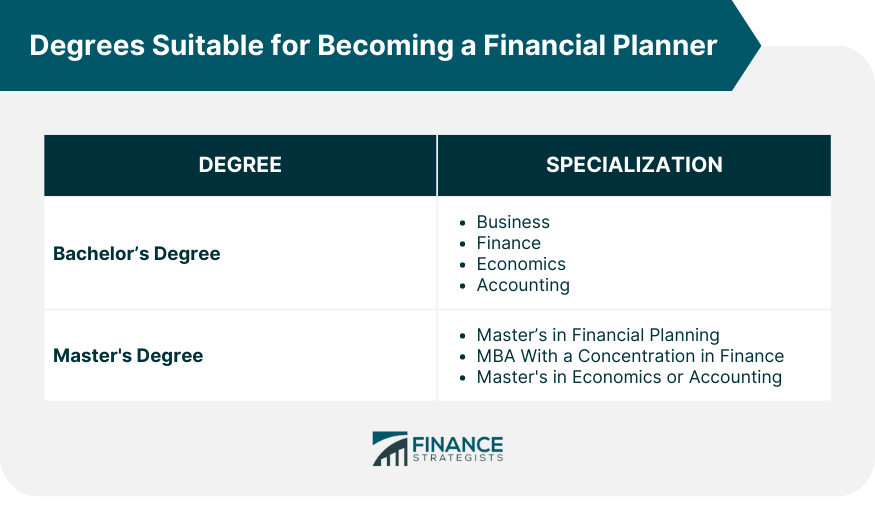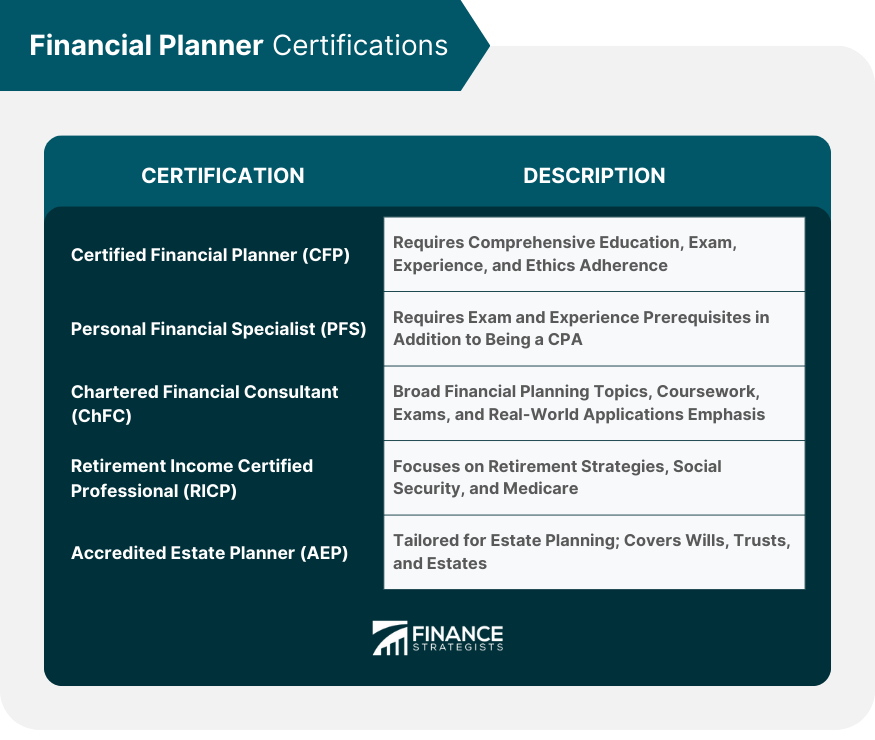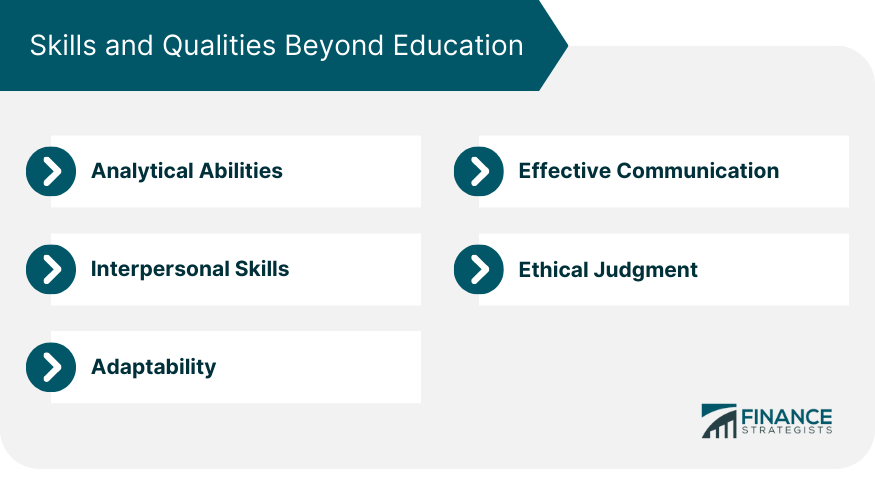A financial planner is a professional who helps individuals and organizations manage their finances to meet life goals and future objectives. This involves understanding a client's current financial situation, identifying short-term and long-term aspirations, and crafting strategic plans to achieve those objectives. Typically, a financial planner's expertise encompasses a variety of financial areas, including investments, savings, retirement planning, estate planning, tax management, and even insurance considerations. They must be adept at listening to their clients, comprehending their unique needs, and devising a tailored financial strategy that maximizes returns while minimizing risks. In essence, they serve as financial navigators, guiding clients through the complexities of financial decisions, ensuring their wealth grows and is protected, and helping them navigate towards a secure financial future. When aspiring to become a financial planner, pursuing a relevant educational background sets the foundation for a successful career. Various undergraduate and postgraduate programs can equip individuals with the required knowledge and skills. A Bachelor's degree in Business typically covers a broad spectrum of subjects including management, marketing, operations, and of course, finance. Graduates are often well-equipped with a holistic understanding of how businesses operate, which can be invaluable when assisting clients with financial decisions that intersect with their business endeavors. This degree is a direct match for those eyeing a career in financial planning. It delves deep into topics like investment strategies, portfolio management, financial institutions, and personal finance, providing a comprehensive base of knowledge directly applicable to the financial planner role. Economics graduates have a keen understanding of macro and microeconomic principles, market forces, and economic trends. This macro view is crucial when helping clients understand the larger economic environment and how it might impact their financial strategies. A foundation in accounting ensures that financial planners can understand and interpret financial statements, manage taxes efficiently, and maintain a clear picture of a client's financial health. Moreover, this degree can be a stepping stone to other certifications like the CPA, which can further enhance a financial planner’s credentials. Tailored specifically for future financial planners, this degree dives deeper into the implications of financial planning, including retirement planning, estate planning, tax planning, and risk management. Graduates often emerge with a specialized skill set that can set them apart in the industry. An MBA, or Master of Business Administration, with a focus on finance, offers a blend of advanced business and financial strategies. This degree is particularly useful for those looking to operate at a managerial level or start their own financial consultancy. These degrees offer advanced insights into their respective fields. A Master's in Economics delves deeper into economic theories, forecasts, and global financial trends. On the other hand, a Master's in Accounting offers intricate knowledge about financial regulations, advanced taxation, and forensic accounting. Both degrees can provide a financial planner with a competitive edge, enabling them to offer specialized services or advice. Acquiring one or more designations not only boosts a financial planner's credibility but also equips them with specialized knowledge to serve their clients better. One of the most prestigious certifications for financial planners, the Certified Financial Planner (CFP) designation is recognized globally. Candidates must undergo a comprehensive educational program, pass a rigorous exam, meet experience requirements, and adhere to a strict code of ethics. Professionals with the CFP certification demonstrate their commitment to providing competent and ethical financial planning services. The designation of Personal Financial Specialist (PFS) is conferred by the American Institute of Certified Public Accountants (AICPA). This qualification is designed for CPAs who seek to enhance their expertise in the realm of personal financial planning. In addition to being a CPA, candidates must pass an exam and meet specific experience prerequisites. Chartered Financial Consultant (ChFC) certification covers a wide range of financial planning topics, similar to the CFP, but without the comprehensive board exam. Candidates must complete a series of coursework and examinations. It offers in-depth knowledge without the emphasis on a single board exam, focusing more on real-world applications. The Retirement Income Certified Professional (RICP) designation equips financial professionals to assist clients with retirement income strategies, Social Security, Medicare, and more. Ideal for professionals aiming to specialize in retirement planning, helping clients ensure a steady income post-retirement. Granted by the National Association of Estate Planners & Councils, Accredited Estate Planner (AEP) designation is tailored for financial planners specializing in estate planning. It covers areas like wills, trusts, and estates. This certification is beneficial for financial planners aiming to offer specialized advice on estate planning, ensuring clients' assets are managed and passed on as per their wishes. Embodying the following traits ensures not only a thriving practice but also a meaningful impact on clients' financial well-being. Analytical Abilities: These abilities allow financial planners to make informed decisions, providing effective recommendations tailored to individual client needs. Effective Communication: Clear communication fosters trust and ensures that clients are comfortable with and informed about the strategies and solutions proposed. Interpersonal Skills: Strong interpersonal connections lead to long-term client relationships, referrals, and increased client satisfaction. Ethical Judgment: Upholding ethical standards ensures the planner's reputation remains intact, and clients feel confident entrusting them with their financial futures. Adaptability: This quality ensures that financial planners remain relevant in their field, continuously offering the most current and effective advice to clients. A financial planner plays a pivotal role in guiding individuals and organizations towards a secure financial future. A bachelor's degree in Business, Finance, Economics, or Accounting equips professionals with essential knowledge. Pursuing a Master's degree, such as Financial Planning, an MBA with a finance focus, or specialized degrees in Economics or Accounting, can provide a competitive edge. Certifications further enhance credibility and knowledge. The CFP, PFS, ChFC, RICP, and AEP designations offer specialized expertise in various aspects of financial planning. Beyond education and certifications, key traits like analytical skills, effective communication, interpersonal abilities, ethical judgment, and adaptability are essential for a financial planner's success. By embodying these qualities, financial planners can navigate clients through intricate financial decisions, ensuring their wealth grows and is safeguarded while fostering lasting relationships built on trust and expert guidance.What Is a Financial Planner?
Degrees Suitable for Becoming a Financial Planner
Bachelor’s Degree
Business
Finance
Economics
Accounting
Master's Degree
Master of Financial Planning
MBA With a Concentration in Finance
Master's in Economics or Accounting

Financial Planner Certifications
Certified Financial Planner (CFP)
Personal Financial Specialist (PFS)
Chartered Financial Consultant (ChFC)
Retirement Income Certified Professional (RICP)
Accredited Estate Planner (AEP)

Skills and Qualities Beyond Education

Conclusion
What Degree Do You Need to Be a Financial Planner? FAQs
To become a financial planner, a bachelor's degree is typically required. Degrees in fields like Business, Finance, Economics, or Accounting provide a solid foundation for this career.
Yes, a degree in Business is suitable for becoming a financial planner. It offers a broad understanding of various business aspects, including finance, which is valuable in guiding clients through financial decisions.
While not strictly essential, a degree in Finance aligns directly with the financial planning role. It covers investment strategies, portfolio management, personal finance, and financial institutions, providing a strong knowledge base for financial planners.
An Economics degree equips you with a deep understanding of economic principles, market trends, and forecasts. This macroeconomic perspective is valuable when helping clients navigate their financial strategies within the broader economic context.
Programs like Master of Financial Planning, MBA with a concentration in Finance, or Master's in Economics/Accounting offer specialized knowledge in areas crucial for financial planners, such as retirement planning, estate planning, and advanced financial strategies.
True Tamplin is a published author, public speaker, CEO of UpDigital, and founder of Finance Strategists.
True is a Certified Educator in Personal Finance (CEPF®), author of The Handy Financial Ratios Guide, a member of the Society for Advancing Business Editing and Writing, contributes to his financial education site, Finance Strategists, and has spoken to various financial communities such as the CFA Institute, as well as university students like his Alma mater, Biola University, where he received a bachelor of science in business and data analytics.
To learn more about True, visit his personal website or view his author profiles on Amazon, Nasdaq and Forbes.











